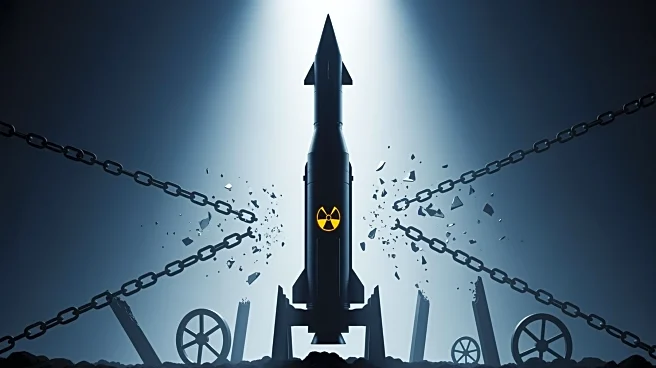What's Happening?
The global landscape of nuclear threats is intensifying as key arms control agreements between major powers erode. The Strategic Arms Reduction Treaty (START), initially signed in 1991 between the United
States and the Soviet Union, aimed to reduce nuclear arsenals and ensure verification. This treaty was later expanded in 2010 as New START, which was extended until February 2026. However, following the conflict in Ukraine, Russia suspended its participation, blocking American inspectors from its nuclear facilities. This suspension has left the treaty's future uncertain, with no new agreements in sight. Concurrently, China is rapidly expanding its nuclear arsenal, adding approximately 100 new warheads annually, and is projected to have 1,500 nuclear weapons by 2035. This expansion, coupled with the integration of artificial intelligence in military decision-making, raises concerns about potential miscalculations and the risk of nuclear conflict.
Why It's Important?
The deterioration of arms control agreements and the expansion of nuclear arsenals by major powers like Russia and China pose significant risks to global security. The absence of treaties like START could lead to an unchecked arms race, increasing the likelihood of nuclear proliferation. The involvement of artificial intelligence in military strategies further complicates the situation, as it may lead to decisions being made without human oversight, heightening the risk of accidental or unintended nuclear exchanges. The geopolitical tensions, particularly surrounding the Ukraine conflict, exacerbate these risks, as demonstrated by recent nuclear exercises conducted by Russia and the U.S. response. The potential for a new arms race not only threatens international stability but also challenges existing non-proliferation efforts.
What's Next?
As the expiration of New START approaches, the international community faces the urgent task of negotiating new arms control agreements to prevent a nuclear arms race. The U.S. may need to extend its nuclear deterrence umbrella to allies like Saudi Arabia to prevent further proliferation. Additionally, there is a need for global cooperation to establish norms for the use of artificial intelligence in military decision-making, ensuring human control over nuclear weapons. Diplomatic efforts to engage China in arms control discussions are crucial, given its rapid nuclear expansion. The U.S. could also consider ratifying the Comprehensive Nuclear Test Ban Treaty (CTBT) to reinforce non-proliferation commitments, provided other major powers do the same.
Beyond the Headlines
The integration of artificial intelligence into military systems introduces ethical and strategic challenges, as it may lead to decisions being made without human intervention. This development necessitates a reevaluation of existing frameworks governing nuclear weapons and highlights the need for new international agreements that address the role of AI in military operations. The potential for AI-driven miscalculations underscores the importance of maintaining open communication channels between nuclear powers to prevent misunderstandings and manage crises effectively.











